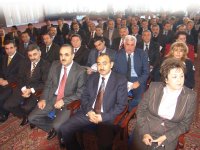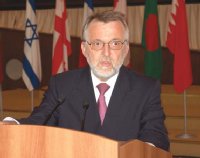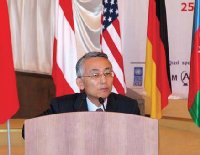
| Home : ITU News magazine | ||||||||||||||||
“History has endowed the Eurasia region with a rich tapestry of peoples, cultures, and natural resources,” underlines the Baku Declaration on the Digital Divide and Knowledge Economy, presented in February 2005 to the second meeting of the Preparatory Committee (PrepCom-2) of the Tunis phase of the World Summit on the Information Society. The Declaration highlights the last ten years where “rapid technological change has made possible the virtual pathways of an electronic silk route, linking Asia with Europe and creating a new heartland for an emerging regional knowledge-based economy.” Like elsewhere in the world, “the future of the Eurasia region depends upon policies that overcome the digital divide and further the transition to a knowledge-based economy,” states the Declaration. It goes on to stress that these policies must ensure that the benefits of the knowledge economy are open and available to all, and that the information infrastructure on which this economy depends is secure, robust and reliable. The Declaration is the fruit of the “Global ICT Conference on the “Digital Divide and Knowledge Economy,” held in Baku (Azerbaijan) in November 2004. It underlines the principles and priorities endorsed by the participants in that conference and their request to have these noted and reflected in the final documents of the World Summit on the Information Society in Tunis in November 2005. It calls on the hosts of the World Summit to organize an open forum on these issues, and to facilitate global understanding of their importance in the conduct of the Summit. Best practices in content creativity, showcasing innovative applications, and a celebration of the achievements of creators in the context of the World Summit Award project should be part of the Tunis agenda. Finally, the Declaration appeals to governments, civil society, the private sector, international organizations and donors to accommodate and apply the Baku principles.
Principles and priorities in the Baku DeclarationGovernment leadership and initiativeGovernment leadership is required to create vision for national development that represents the interests and needs of all of its citizens. Societal transformation necessary in the information age entails difficult choices and trade-offs that must defend the broader public interest. As representatives and custodians of the public trust, governments must lead to establish an enabling environment that benefits all of their citizens. Government is required to ensure both political and administrative support for information and communication technologies (ICT), demonstrating commitment and ownership towards ICT as a tool for development.
Strengthened partnership with the private sectorPrivate sector contribution is critical to implementing long-term solutions to the digital divide and establishing the basis for sustainable knowledge economies. These economies, and the infrastructure on which they depend, require a culture of initiative, innovation and risk-taking that the private sector can provide. “Lessons learned” and best practices of existing partnerships need to be shared, and new forms of partnership, including between the public and private sectors, should be promoted and encouraged to emerge. Dialogue, consultation and partnership with civil societyDialogue with civil society is necessary so that the interests of all citizens — particularly those least advantaged — have a voice in shaping the knowledge society. In an age of increased global insecurity, the rights of citizens to provide input to public policy must be defended, in order to ensure that legitimate security concerns do not undermine long-term prosperity, development and internationally recognized human rights conventions. InclusionICTs and the benefits of the information revolution must be available and accessible to all citizens, especially socially disadvantaged groups and peoples. Special emphasis must be placed on the full inclusion of women, and consideration given to societies that are recovering from the effects of natural disasters and conflict. Measures and policies must be developed through multi-stakeholder partnerships and dialogue between government, the private sector and civil society, to build an inclusive knowledge-based society. EducationEducation is the key to building knowledge economies. Overcoming the digital divide and building sustainable knowledge economies is not possible without a long-term commitment to education, lifelong learning and support for research. Education must be accessible and open to all citizens; knowledge economies are dependent on all the contributions of all segments of society. A knowledgeable, educated and skilled citizenry can contribute most to the prosperity and stability of the region. The use of ICT in education, where possible, should be encouraged; as should the strengthening of international cooperation and networking in education on a regional and global level.
Accountable Internet governanceThe Internet is a strategically important component of national information infrastructures. All stakeholders — the private sector, civil society and national authorities (which constitutionally represent the public trust and act to defend and represent the public interest) — should participate on an equal and democratic basis in the governance of the Internet through appropriate representative international mechanisms. The character of the Internet as an open and democratic medium should be preserved and furthered. In this context, participants in the Baku Conference expressed support for the work of the Working Group on Internet Governance. Financing ICT for developmentEnsuring that the benefits of the knowledge economy will be equitable requires a commitment from national governments, the private sector and civil society. Development of new partnerships between governments, the private sector, civil society and multilateral and bilateral actors, should be encouraged. Best practices must be shared, and investment in less advantaged areas supported to ensure the prosperity and security of the Eurasia region. In this context, the Baku Conference expressed support for the work of the Task Force on Financial Mechanisms that reviewed the adequacy of existing mechanisms in meeting the challenges of ICT for Development. The objectives of the Digital Solidarity Fund are meant to deal with inadequacy of present measures, and more effective financing mechanism need to be identified. Governments should also be encouraged to include specific allocations in State budgets for expenditures designed to overcome the digital divide and further progress towards a knowledge economy. Safety, security, privacyGiven the strategic nature of national information infrastructures, and their centrality to the functioning of all modern societies — reliability, security and protection from abuse requires urgent attention. The problem of computer viruses and spam needs to be addressed urgently. Criminal activities exploit areas in which law does not exist, or where technology is moving faster than the ability of society to adopt rules and regulations that safeguard the public good. Security is a requirement of the information age that defends the State and societal interest and must be ensured through appropriate self-regulation, national legislation and international treaties, norms and conventions. Respect for individual privacy and protection of personal data is also fundamental to the development of an information society that balances security concerns for security with internationally accepted norms such as the United Nations Declaration of Human Rights. Intellectual property rights and contentContent development and an open and internationally equitable mechanism for adjudicating intellectual property rights (IPR) are vital to realize a vision for sustainable cultural identity and diversity, and make accessible the benefits of a global knowledge society. The Baku Conference recognized the role of IPR as critical to facilitating economic development. But it also underlined that this must be balanced by the right for circulation and sharing of knowledge, including recognizing the importance of free and open software and alternative licensing regimes. Conventions of the Council of Europe on regulating content and activities deemed to be harmful or exploitive need to be addressed through appropriate national legislation and international law.
|
||||||||||||||||







